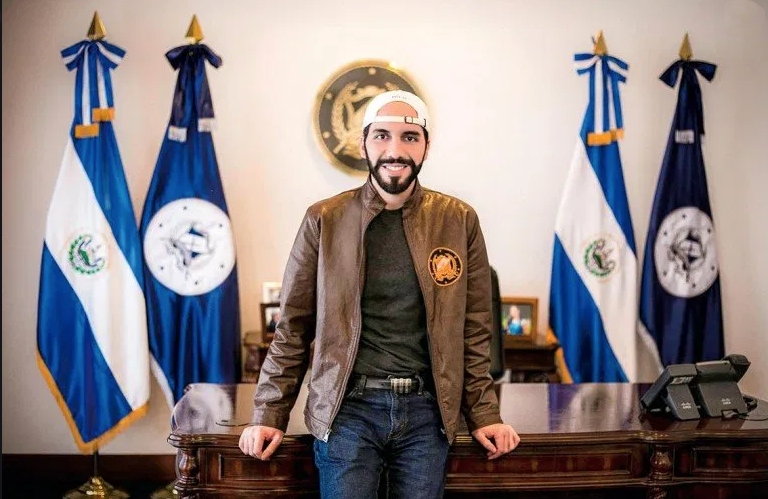His 39 years, slicked back hair, casual dress and addiction to Twitter – from where he orders lay-offs of officials or communicates decrees – could mistake him for an amateur. But El Salvador’s center-right president, Nayib Bukele, knows what he is doing. He has had a glittering political career. He began by being elected in 2012 as mayor of a small town, Nuevo Cusclatán. In 2015 he won the mayoralty of the capital, San Salvador. And in 2018 he founded the New Ideas party, an electoral platform that helped him, despite the fact that he competed for the GANA party, to win the presidential elections in 2019.
Elected in a struggling democracy, in less than two years he has managed to subjugate the other two branches of government. This year, Bukele is preparing to constitutionalize his government’s authoritarian drift when he unveils his constitutional reform bill in September. Critics fear that Bukele will seek to strengthen the authority of the executive and try to retain power beyond 2024, when his five-year term expires.
The dismantling of Salvadoran democracy has been systematic and dizzying. Just as Hugo Chavez broke with the two-party system of COPEI and Accion Democratica when he won the 1998 presidential elections in Venezuela, Bukele broke with the duopoly maintained since the 1992 Peace Accords by the right-wing ARENA and the left-wing FMLN.
In both Venezuela and El Salvador, the party system was discredited, and the winning candidates created parties centered on their personalities, presenting themselves as “outsiders” who promised to bury corruption and the oligarchies that sustained it. Since then, Bukele has not stopped committing a long list of abuses against his opponents, be they individuals, organizations, or institutions. His feints at democratic rules and practices evoke the legendary filigrees of “Mágico González,” the legendary Salvadoran soccer player, in the Cadiz of the 1980s. According to Freedom House, in 2019 El Salvador went from being “free” to “partially free”. This year Bukele could be enshrined as dictator.
The young president notably consolidated his power when Nuevas Ideas swept the elections of last February 28 and obtained two thirds of the Legislative Assembly, winning 56 of the 84 seats. The government added 8 legislative seats to the allied parties of GANA, PCN, and PDC, allowing them to legislate without opposition. On its first day of sessions, the new legislature dismissed the magistrates of the Constitutional Chamber of the Supreme Court and the attorney general, which in practice allowed the government to control the judiciary.
In addition to subordinating the three branches of government, Bukele has politicized the military and the police. In February 2020, he surrounded the access streets to the Legislative Palace with police and entered the building with armed soldiers to intimidate the deputies and induce them to approve a loan request to finance his public security plan. In an act that portrays him well, during the assault he calmly sat in the Legislative Assembly president’s chair and said: “It is clear who is in control here”. Then he prayed and withdrew quietly. Like a complete bastard.
Bukele’s ability to bend wills and subdue institutions is based on his popularity. Despite the criticisms of the national and international press, Bukele is extraordinarily popular – just like Chavez, particularly in his first authoritarian steps – and has had approval ratings above 90% during a good part of his term.
The next step for Bukele is to constitutionalize his tropical-tuitero despotism, something for which he already has a project whose premiere is planned for September (as long as the authoritarian itch does not hurry him). In the same month of 2020, the government announced a commission led by Vice President Felix Ulloa to elaborate a constitutional reform project.
Although the government assured that the objective is to update and perfect the current magna carta, ruling out “eliminating the alternation in the exercise of the presidency of the republic”, journalists, academics, politicians and civil society leaders fear that Bukele seeks to use the constitution to consolidate his power and repeal article 258 to be reelected to the presidential chair.
A traditional millennial
Although Bukele was elected at only 37 years old, the millennial embraces a centuries-old tradition. A considerable number of Latin American heads of government who have made their mark since the 20th century have manipulated constitutions to suit their authoritarian needs. They have circumvented, suspended, reformed or replaced them to increase the president’s powers, stay in power longer, or both.
Such emblematic leaders as Juan Domingo Perón and Carlos Menem of Argentina, Evo Morales or Victor Paz Estenssoro of Bolivia, the Somoza dynasty or Daniel Ortega of Nicaragua, Marcos Pérez Jiménez or Hugo Chávez of Venezuela, Alberto Fujimori of Peru or Rafael Correa of Ecuador, to name a few, have been successful in their efforts to extend their terms in office. In Bukele’s homeland, Salvador Castañeda tried to extend his term in 1948 but was removed in a military coup.
In any case, the list is long. According to data that has been collected from both presidential biographies and national constitutions, between 1945 and 2012 31 presidents from all Latin American countries (except Mexico) and from all political regimes – democracies, semi-democracies, and dictatorships – tried on 40 occasions to change or reinterpret the constitution to stay in power beyond their term. They succeeded on 29 occasions.
What can be expected?
Predicting events is risky. Mass protests or internal betrayals can always change the course of an authoritarian government. But the road is clear for Bukele to succeed this year in transforming El Salvador from a semi-democracy to a dictatorship, as it was until 1992.
In El Salvador there are no institutions or organizations with the apparent capacity to stop him. The United States does not seem to have the will to go beyond diplomatic pressure, the OAS is faithful to its inability to stop authoritarian regressions, and the other governments of the region avoid sovereign interference. One of the great unknowns is whether El Salvador will export authoritarianism to Guatemala and Honduras, the two semi-democracies with which the country shares porous borders, right-wing presidents with authoritarian tendencies, and high-level politicians involved in corruption.
*Translation from Spanish by Eleanor Gaddy
Autor
Profesor asistente de Ciencia Política en la Universidad Carnegie Mellon. Doctor en Ciencia Política por la Universidad de Pittsburgh. Especializado en presidencialismo y en el estudio comparado de las instituciones políticas de América Latina.











